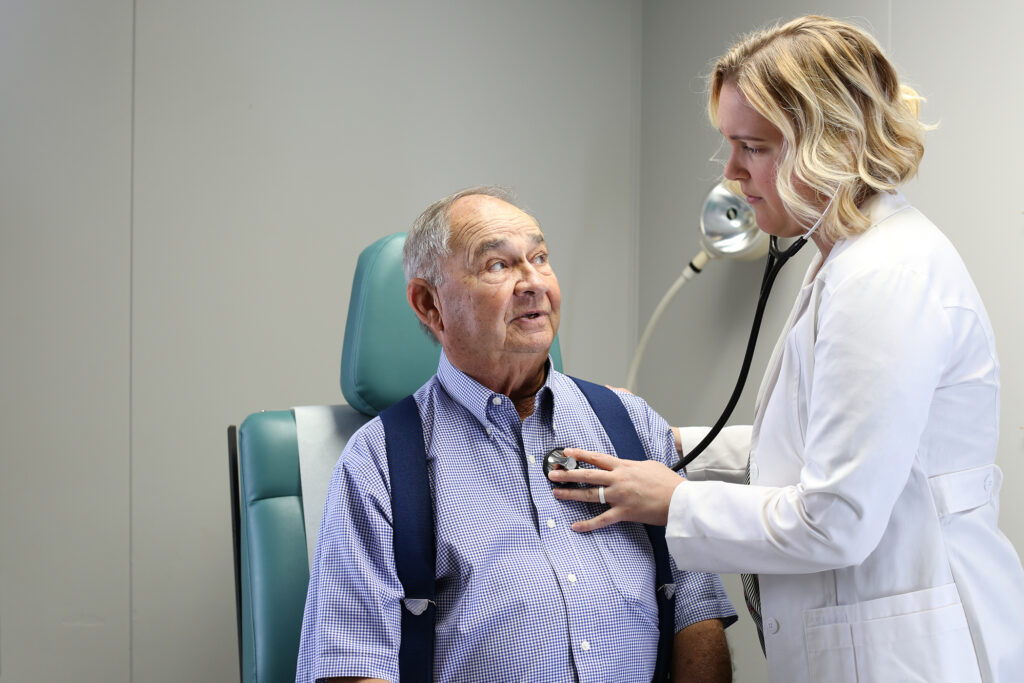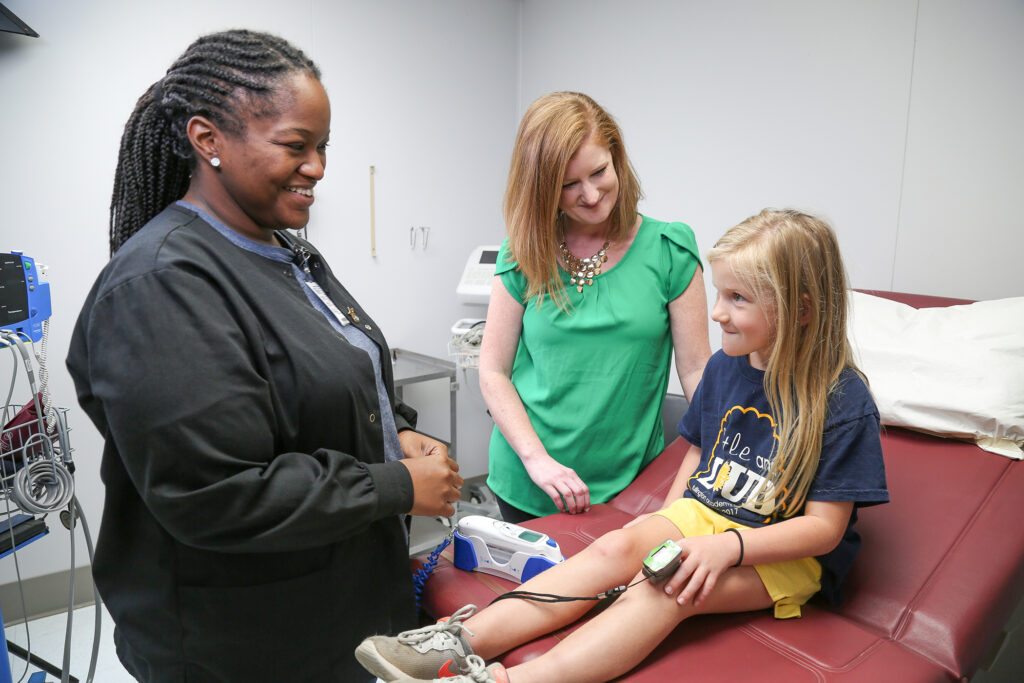Without assistance from the University of Georgia, Taylor Regional Hospital in Hawkinsville might have closed six years ago.
Instead, last month, community leaders broke ground on a project to include emergency room expansion, a new lobby and state-of-the-art equipment.
“With over 20,000 emergency room visits a year, and as a member of Georgia’s state trauma network, the new emergency department will give us a spacious, modern facility where we can continue to give world-class care, here close to home,” Dr. Robert Campbell, general surgeon with Ocmulgee Surgical Associates, said at the groundbreaking. “It’s an obvious sign that Taylor Regional Hospital is stronger than ever and here to provide care for our Hawkinsville families for years to come.”

A patient has his heartbeat checked by a health care worker at Taylor Regional Hospital. (Photo taken by Shannah Montgomery in 2018)
That was not the case in 2015. The hospital was broke and facing the deadline for a federally mandated Community Health Needs Assessment (CHNA), which would require hiring a consultant. Without the CHNA, required by the Affordable Care Act, the hospital might lose its nonprofit status and be forced to close.
Thirteen rural Georgia hospitals have closed since 2013, according to the Georgia Hospital Association. Two — Dorminy Medical Center in Ben Hill County, and Southwest Georgia Regional Medical Center, in Randolph County — closed last fall. More are expected as the COVID-19 pandemic continues to strain health resources across the state.
As a UGA Archway Partnership community, Pulaski County had full access to the university’s vast resources. Two Ph.D. students in UGA’s College of Public Health took on the assessment, conducting focus groups and administering a survey to members of the community to gauge their use of the facility. Not only did the CHNA show the hospital was needed, it also showed the community would benefit from an outpatient clinic to treat injuries and illnesses that would otherwise turn up in the emergency room.
Taylor Express Care opened in 2016, cutting ER visits by 23 percent, from 6,000 a year to 4,600.
Faculty and students from UGA’s College of Public Health and College of Pharmacy have continued helping Taylor Regional complete its CHNA since that first one in 2015.
A health care worker reads over a chart at Taylor Regional Hospital. (Photo taken by Shannah Montgomery in 2018)
“Archway is always very instrumental in helping with the task and very much appreciated through our partnership,” said Jon Green, CEO of Taylor Regional Hospital. “We take very seriously the needs of the community including access to care, timely appointments and appropriate number of clinics to make appointments available.”
In the past two years the hospital has added complete digital radiology, 3D high-speed mammography, and a large MRI to accommodate people who have claustrophobia. A new CT scanner will be added this fall.
Now the hospital is upgrading its services, renovating the medical floor and adding a new oxygen system.
“This includes new monitoring equipment, beds, fixtures and furniture. Basically, areas we are renovating will be new from top to bottom,” Green said. “By improving and expanding, the hospital keeps its clients instead of losing them by having to send them elsewhere for service.
“This expansion allows us to be positioned stronger for the future and further become an anchor for Hawkinsville,” Green said.
Shelly Berryhill, Hawkinsville city commissioner and Archway executive committee member, knows firsthand how important the local hospital can be. Diagnosed in March 2020, Berryhill was the first documented COVID-19 case to arrive at Taylor Regional.
“Taylor Regional is absolutely vital to the economic success of both our community as well as surrounding communities,” Berryhill said. “This expansion shows both the vitality of our hospital as well as the fact that the leadership is looking ahead to the future.”
Jenna Mashburn, Pulaski County sole commissioner and Archway executive committee chair, was once the communications director for Taylor Regional Hospital.
“I represent one of the thousands of lives in this community that depend on this hospital,” Mashburn said. “Taylor Regional is truly a place when you walk in the door you feel like family almost immediately. The new ER is paramount to the continuity of care that Taylor Regional has offered for nearly a century.”
